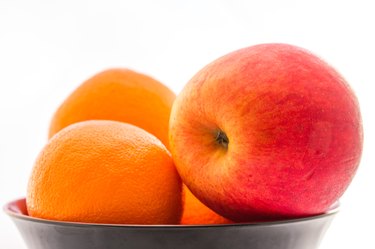
Fruits provide a variety of nutrients including vitamins A, C, K and the B-complex vitamins. These vitamins play several essential roles in the body and are vital for proper function. Health conditions may arise primarily due to deficiencies in one or more nutrients. The risk of vitamin C deficiencies may be higher in individuals who do not consume the recommended three to five servings of fruit each day. The Centers for Disease Control and Prevention reports that less than one-third of Americans eat two or more servings of fruit each day, based on 2005 data.
Scurvy
Video of the Day
Scurvy describes a condition caused by a severe vitamin C deficiency. This nutrient is a water-soluble vitamin, meaning you must get adequate amounts daily because the body doesn't store it. Fruits such as oranges and strawberries provide excellent sources of this vitamin responsible for the synthesis of collagen for tendons, ligaments and other tissues. Symptoms include fatigue, bleeding in gums and eyes, and rapid breathing. Treatment involves vitamin C supplementation either orally or through injections. In the U.S., the elderly are at the highest risk of developing this condition.
Video of the Day
Heart Disease
A 2003 study by Children's Hospital in Massachusetts found a positive association between adequate vitamin C and a decreased risk of heart disease in women. Since fruits are one of the primary sources of vitamin C, a diet low or devoid of fruits without supplementation may place you at added risk of heart disease, especially if you have other risk factors such as smoking.
Cancer
Fruits provide not only important nutrients but also a good source of dietary fiber. A diet low in fruits, therefore, may lower your fiber intake. A 2011 study by Loma Linda University in California concluded that regular, frequent consumption of foods such as fruits and vegetables lowered the risk of developing colorectal polyps, a precursor to cancer.
Anemia
Nutrients used by the body often have complex chemical relationships with other nutrients. Vitamin C is no exception. This nutrient helps the body absorb iron. Women aged 19 to 50 should consume 18 g of iron daily. Deficiencies in iron can cause iron deficiency anemia due to deficiencies in vitamins A and C, both of which fruits provide. Women of childbearing age and pregnant women are at the greatest risk of developing this condition. This relationship illustrates the importance of a complete diet for optimal health.
- Colorado State University Extension; Vitamins: Introduction and Index; R. Bowen; August 2003
- "Morbidity and Mortality Weekly Report"; State-Specific Trends in Fruit and Vegetable Consumption Among Adults: United States, 2000-2009; September 2010
- MedlinePlus: Scurvy
- "Journal of the American College of Cardiology"; Vitamin C and Risk of Coronary Heart Disease in Women; S. Osganian, et al.; July 2003
- "Nutrition and Cancer"; Foods and Food Groups Associated With the Incidence of Colorectal Polyps: The Adventist Health Study; Y. Tantamango, et al.; May 2011
- Office of Dietary Supplements: Iron
- Colorado State University Extension; Water-Soluble Vitamins; J. Anderson and L. Young; August 2008
- Linus Pauling Institute: Vitamin C